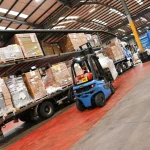
The Role of Wooden Pallets in Kenya’s Growing Food and Fruit Export Market
1. Introduction
Kenya has established itself as a major player in the global food and fruit export market, supplying a variety of agricultural products to destinations worldwide. From avocados and mangoes to tea and coffee, the country’s agricultural exports contribute significantly to its economy. However, for Kenya’s food exports to reach international markets in the best condition, proper handling and packaging are crucial.
One of the most essential yet often overlooked components of the export supply chain is the wooden pallet. These simple yet effective platforms play a vital role in ensuring that food and fruit shipments are transported safely, efficiently, and in compliance with international standards. In this article, we explore the role of wooden pallets in Kenya’s growing food and fruit export industry, highlighting their benefits, challenges, and future prospects.
2. Understanding Wooden Pallets
What are Wooden Pallets?
Wooden pallets are flat transport structures used to support goods and make handling, storage, and transportation easier. They allow products to be stacked and moved using forklifts, pallet jacks, and conveyors, making logistics more efficient.
Different Types of Wooden Pallets
Wooden pallets come in various designs, each serving a different purpose. Some common types include:
- Stringer Pallets – These have parallel wooden beams (stringers) supporting the top deck boards.
- Block Pallets – These use both stringers and blocks, providing more strength and allowing forklift entry from all sides.
- Double-Face Pallets – These have top and bottom decks, enhancing stability and weight distribution.
- Reversible Pallets – These can be used on either side, offering more flexibility in stacking.
Common Materials Used in Pallet Manufacturing
Most pallets are made from hardwood (e.g., oak, mahogany) or softwood (e.g., pine). In Kenya, eucalyptus and cypress are commonly used due to their availability and durability.
3. The Significance of Wooden Pallets in the Supply Chain
Wooden pallets are an integral part of the global supply chain, particularly in food and fruit exports. Their importance can be seen in:
- Facilitating Easy Handling and Transportation
Pallets allow for efficient loading, unloading, and stacking of goods, reducing labor costs and saving time. - Reducing Damage to Goods
By keeping food products elevated and secure, pallets help prevent physical damage during transit, ensuring that fruits remain fresh and undamaged upon arrival. - Ensuring Compliance with International Export Standards
Many countries require wooden pallets to meet phytosanitary regulations (e.g., ISPM-15) to prevent the spread of pests. Properly treated pallets help Kenyan exporters gain access to more markets.
4. Kenya’s Major Food and Fruit Exports
Kenya’s food and fruit export industry is diverse, with key exports including:
- Avocados – Kenya is among the world’s top avocado exporters, supplying markets in Europe, the Middle East, and Asia.
- Mangoes – A major export product, with high demand in the Middle East and Asia.
- Pineapples – Exported to markets in Europe and Africa.
- Tea and Coffee – Two of Kenya’s most valuable exports, requiring specialized packaging and handling.
Given the fragile nature of fruits and the importance of maintaining freshness, using the right packaging and logistics solutions, including wooden pallets, is critical.
5. Benefits of Using Wooden Pallets in the Food Export Industry
Kenyan exporters prefer wooden pallets for several reasons:
- Durability and Strength
Wooden pallets can withstand heavy loads, making them ideal for transporting bulk food shipments. - Cost-Effectiveness
Compared to plastic or metal alternatives, wooden pallets are more affordable and widely available, making them a practical choice for exporters. - Eco-Friendliness and Recyclability
Wooden pallets can be reused multiple times and are biodegradable, making them an environmentally friendly option. Many Kenyan manufacturers are adopting sustainable forestry practices to ensure a steady supply of pallet wood.
6. Challenges Associated with Wooden Pallets in Kenya
Despite their benefits, wooden pallets come with challenges:
- Availability and Quality of Wood
Kenya faces deforestation concerns, making the supply of quality wood for pallets limited. - Pest and Contamination Risks
Wooden pallets can harbor pests, which is why international regulations require heat treatment or fumigation before export. - Compliance Costs
Meeting global standards like ISPM-15 certification adds extra costs for exporters, increasing overall production expenses.
7. The Role of Pallet Standardization in Export Success
For Kenya’s food and fruit exports to compete globally, they must meet strict international shipping and packaging regulations. One of the most crucial aspects is pallet standardization.
International Pallet Standards
Exported goods must be placed on pallets that comply with global standards such as:
- ISPM-15 (International Standards for Phytosanitary Measures No. 15) – Requires wooden pallets to be heat-treated or fumigated to prevent the spread of pests.
- Euro Pallets (EUR/EPAL Pallets) – Widely accepted in European markets and used for seamless transport across different supply chains.
- GMA (Grocery Manufacturers Association) Pallets – The preferred standard for North American food exports.
Why Meeting Standards is Crucial for Kenyan Exporters
Non-compliance with pallet standards can lead to:
- Delayed shipments due to customs rejections
- Extra costs for repackaging and re-shipping
- Loss of business opportunities in key markets
Steps Taken by Local Industries to Improve Pallet Quality
- Increased investment in heat treatment facilities to ensure ISPM-15 compliance
- Adoption of eco-friendly wood treatment techniques to reduce chemical usage
- Training programs for exporters on the importance of pallet standards
8. Wooden Pallets and Cold Chain Logistics
Importance of Pallets in Maintaining Freshness
Kenya exports perishable fruits like avocados, mangoes, and pineapples, which require controlled temperature storage. Wooden pallets play a key role in efficient cold chain logistics by:
- Allowing proper airflow around products
- Reducing direct contact with cold storage floors, which helps maintain consistent temperatures
- Preventing bruising and damage during transit
How Pallets Improve Efficiency in Cold Storage and Transportation
- Stackability – Pallets enable better organization in cold storage facilities.
- Easy Movement – Palletized goods can be quickly loaded and unloaded, reducing the risk of spoilage.
- Compatibility with Refrigerated Containers – Wooden pallets fit well in reefer (refrigerated) containers, ensuring a seamless transport process.
Case Studies of Successful Cold Chain Logistics Using Pallets
- Avocado Exports to Europe
- Kenyan avocados require temperature-controlled transportation (5-6°C) to maintain freshness.
- Palletized shipments reduce handling time and keep fruits in optimal condition.
- Mango Exports to the Middle East
- Mangoes are transported in ventilated cartons on wooden pallets to prevent premature ripening.
- The use of standardized pallets has improved acceptance rates in Dubai and Saudi Arabia.
9. The Impact of Wooden Pallets on Reducing Food Waste
Food waste is a significant challenge in Kenya’s export industry, often caused by poor handling and inadequate packaging. Wooden pallets contribute to reducing waste in the following ways:
1. Protection from Physical Damage
- Shock Absorption – Wooden pallets prevent bruising and crushing of delicate fruits.
- Minimized Direct Contact – Palletized goods are elevated from rough surfaces, preventing unnecessary damage.
2. Prevention of Contamination During Transit
- ISPM-15 Treatment Ensures Clean Pallets – Heat-treated wooden pallets prevent bacteria and pests, reducing food contamination risks.
- Hygienic Storage – Palletized products remain off the ground, avoiding exposure to dirt and moisture.
3. Enhancing Supply Chain Efficiency
- Faster Handling Reduces Spoilage – Quick loading/unloading prevents prolonged exposure to heat and humidity.
- Uniform Packaging Reduces Waste – Standard pallet dimensions ensure optimal space usage in shipping containers, preventing unnecessary movement and damage.
10. Sustainability and Environmental Concerns
Sustainable Wood Sourcing and Reforestation Efforts
Kenya is taking steps to ensure wooden pallets remain environmentally sustainable by:
- Encouraging the use of fast-growing tree species (e.g., eucalyptus, pine) for pallet production.
- Supporting reforestation programs to balance wood consumption.
- Promoting wood recycling initiatives in the logistics sector.
Recycling and Reusing Wooden Pallets
- Reusing pallets for multiple shipments reduces waste.
- Damaged pallets are repaired instead of being discarded.
- Old pallets are converted into furniture, wood chips, or biofuel, minimizing landfill waste.
Alternatives to Traditional Wooden Pallets
While wooden pallets remain dominant, some companies are exploring:
- Plastic pallets – More durable and resistant to pests but costly and less eco-friendly.
- Composite pallets – Made from a mix of recycled wood and plastic, offering durability and sustainability.
11. The Future of Wooden Pallets in Kenya’s Export Market
Innovations in Pallet Design and Technology
- Lightweight pallets – Reducing shipping costs without compromising strength.
- Smart pallets with RFID chips – Helping track shipments in real-time.
- Water-resistant and pest-resistant treatments – Enhancing durability for export markets.
Growth of the Pallet Manufacturing Industry in Kenya
- Increased demand for pallets has led to new local manufacturers entering the market.
- Government incentives for sustainable wood sourcing and pallet production are supporting the industry’s growth.
- Training programs for pallet manufacturers ensure better compliance with international standards.
Potential Policy Changes Affecting Pallet Use
- Stricter environmental regulations may impact the types of wood used.
- Increased focus on carbon footprint reduction may encourage exporters to switch to recyclable and sustainable pallets.
12. Conclusion
Wooden pallets are an indispensable part of Kenya’s growing food and fruit export industry, providing efficient, cost-effective, and sustainable solutions for transporting perishable goods. Their role in cold chain logistics, compliance with international standards, and waste reduction makes them a key factor in Kenya’s global export success.
To maximize the benefits of wooden pallets, Kenyan exporters must continue to invest in high-quality pallet production, ensure compliance with global regulations, and embrace sustainable practices. With ongoing innovations and increasing awareness about environmental responsibility, the future of wooden pallets in Kenya’s export market looks promising.
FAQs
1. Why are wooden pallets preferred over plastic pallets in Kenya’s export market?
Wooden pallets are cheaper, widely available, and biodegradable, making them a cost-effective and sustainable choice for Kenyan exporters.
2. How does ISPM-15 certification affect wooden pallet use in exports?
ISPM-15 requires wooden pallets to be heat-treated or fumigated to prevent the spread of pests, ensuring compliance with international trade regulations.
3. What challenges do Kenyan exporters face in using wooden pallets?
Challenges include limited wood supply, pest contamination risks, and compliance costs associated with meeting global standards.
4. How do wooden pallets help maintain fruit freshness during export?
Palletized shipments improve air circulation, reduce handling time, and facilitate efficient cold storage, ensuring fruits remain fresh.
5. Are there environmentally friendly alternatives to wooden pallets?
Yes, options like plastic pallets, composite pallets, and recyclable wooden pallets are being explored as sustainable alternatives.





Add a comment